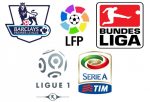It was the FIFA world cup in 2014 where the national German soccer team fascinated the world with its breathtaking playing style. Players like Klose, Schweinsteiger, Lahm, and Özil disgraced Brazile in the semifinals of the competition winning 7-1. Ultimately, Mario Götze, with the assistance of Andre Schürrle, scored the goal to heaven in the 113th minute of the World Cup final versus Argentine. The World Cup win has been a result of Joachim Löw’s (team manager) effort to steadily improve his idea of possession soccer. However, in the past year, Löw’s critics in Germany became more and more.
At the last World Cup in 2018, Germany experienced a big shock by not surviving in their group with Mexico, Sweden, and South Korea – nations that Germany used to beat naturally when the pressure was on. Germany’s drop out illustrated that other teams found ways to deal with the high possession strategy of Germany that Löw counted on.
Since then, Germany dropped out of the first group of the newly implemented Nations League losing, for example, in France (2-1) and in the Netherlands (3-0). Overall, in 2018, Germany could only win only four out of thirteen matches.
With the beginning of the year 2019, Löw decided to do radical roster changes and with it, the playing style. Sami Khedira, center midfielder from Juventus Turin, was not considered as an option anymore for Löw and his staff since the World Cup. Additionally, Löw recently announced that he is not planning to nominate the three Bayern Munich stars Thomas Müller (29), Jerome Boateng (30), and Mats Hummels (30) in the future due to weak performances. The trio had a massive impact on the success in the past. Löw’s decision, as well as the time to announce it, were chiefly criticized by the players and many experts. The coach cut off most of the experience that the team had, even though he always referred to the importance of these experienced players in his squad. Together, the three Munich players count 246 appearances for the national team.
Now, the only leaders left are captain Manuel Neuer (32) and Toni Kroos (29). Other players as Joshua Kimmich (24), Leon Goretzka (24), or Julian Draxler (25) receive more space to develop their abilities. However, they also have to deal with the pressure to become leaders of a very young team. Subsequently, the new concept of “Die Mannschaft” is still comprised of possession, but Löw demands more dynamic and energetic attacking. For that, he needs his young forwards, led by super talent Leroy Sané (23), to drop back and create holes in the defense of the opponents and use these holes to send players in there with long through passes.
In the Europe Cup qualification game, in Amsterdam versus the Netherlands last Sunday, the team already demonstrated what this new playing attitude could look like. At the 3-2 win over the Netherlands, the attacking duo of Leroy Sané and Serge Gnabry kept the Dutch defense, led by Liverpool star Virgil Van Dijk, busy using their pace and dribbling skills. The two put Germany 2-0 in front in the first half that Germany controlled. Although the Netherlands dominated in the second half and came back to a draw, Germany found a final answer in the 90th minute in the person of Nico Schulz who scored the decisive 3-2. Before coach Löw countered his critics substituting in Ilkay Gündogan and Marco Reus who assisted the goal in a co-production.
Despite many critics for Joachim Löw, his team, and a year (2018) to forget, the reforms in the national team should tune the German fans optimistic for the future. There is massive potential in the German roster and a coach willing to change his concept.
Author Profile
Latest entries
 BonusMarch 26, 2019The Rebirth of the German National Team
BonusMarch 26, 2019The Rebirth of the German National Team BonusMarch 19, 2019Investor Billions finally Paying Off for Premier League Teams
BonusMarch 19, 2019Investor Billions finally Paying Off for Premier League Teams BonusMarch 12, 2019Are there more Miracles to happen in the UEFA Champions League?
BonusMarch 12, 2019Are there more Miracles to happen in the UEFA Champions League? BonusMarch 2, 2019MLS Preview: New England Revolution at FC Dallas
BonusMarch 2, 2019MLS Preview: New England Revolution at FC Dallas

